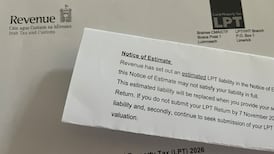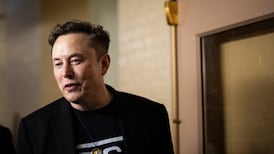PICTURE this an Irish coastline with a few small inshore fishing vessels, while former skippers and crew who chose to spend their lives at sea now work in processing factories ashore. The catch is landed from supertrawlers which rarely come to port their home base being Vigo, La Coruna or Boulogne.
The Irish skipper owner? Like the small farmer, consigned to economic history books...
It's a startling vision of a "blue Europe" which has landed the controversial EU Fisheries Commissioner, Emma Bonino, in hot water. She believes fewer, larger vessels will help to conserve stocks, while she is also in favour of liberalising markets, and providing the European consumer with cheap fish. The casualty? Small fishing communities everywhere.
"Look, this is not my choice," she told The Irish Times this week in Venice, where she is hosting a conference on management of Mediterranean fisheries. "I would have a better life if there was enough fish for everybody. But I'm just saying that the fisheries sector is losing out on the added value which could be earned by transformation.
"There is a demand for processed fish, and the trend is upwards. Someone will answer this demand. If it is not the coastal region, it will be Paris or Milan. Someone will do it because the market is asking for it."
The current level of employment at sea is not sustainable, in her view. "I'm saying to fishing communities, don't let the added value of your fish be stolen from you by a fish processor in Hamburg. The resources are as they are. We have to fish less. I think it would be wiser if the shore based industry was in the coastal region."
Was the Commissioner using the conservation argument to provide cheaper fish? "Prices are going up for the consumer, because fishermen are working harder to make a living and catching less fish," she replied. "If we can't stabilise the sector, no one benefits."
Unpopularity is something that the fiery Italian has to cope with in this portfolio, in contrast to the profile she enjoys on humanitarian affairs, most recently in relation to Zaire. She has made no secret off her effort to try to dispose of fisheries, when first allocated it along with the humanitarian brief and consumer affairs.
"I think in some ways the fishermen hate me but they love me," she said, months after the angry response to her demand for a 40 per cent fleet cut. "In any case, it is a relationship! I made a major effort to travel around, I know I am not bringing a popular message, and I am sorry but I have to do it. Butt even insulting letters from Britain were a positive sign. For the first time, they knew the first name of their commissioner. That is a major change.
"And I answered all the letters, thanking them for writing and explaining to all of them. Most of the letters had very little to do with fish, most had a Eurosceptic approach."
Could she see the EU breaking up over fishing policy, given the strains already evident in situations like the Greenland halibut dispute with Canada in 1995? "No, just the contrary," she said firmly. "There is no national solution to fisheries management. We have to lead with difficult change."
The EU Common Fisheries Policy, which came into force in 1983 and is due for review in 2002, has flaws, the Commissioner acknowledged, commenting on the detention of a Spanish flagship with a suspected "secret hold" off the Co Kerry coastline this week.
"Talking about control, in this sector there is no saint, because there are not enough resources for everybody. To increase the catch means breaking the law. The control dossier is certainly one of the policy's shortcomings. But Ireland has been given greater funds than any other state for surveillance, and this is a special concession."
The Commissioner said that she was in favour, in principle, of the concept of regional management, as demanded by the Irish fishing industry. This would be considered in the context of review of the Common Fisheries Policy, which was "wide open", she said. She rejected claims that terms on fishing permits, written into the EU accession treaties of Finland and Sweden in 1994, had severely limited the scope for change.
"I want to start discussion on the review in early 1997, listening to proposals from the bottom up, rather than top down." Even the concept of traditional rights to fishing areas, as claimed by Spain off the Irish coast, could be up for revision, she suggested.
New Zealand represents a model for future fisheries management in Europe, the Commissioner said. "It has introduced tough management of the resources, and the ministry's title is seafood, rather than fisheries, which makes sense," she said.
The Commissioner has also said: that she is developing a new philosophy on third country agreements, where the EU buys fishing rights in nonmember coastal states to meet the market demand. The agreement recently concluded with Morocco, after protracted negotiations, was an example.
Referring to the recent fisheries council, she said European fisheries ministers were not facing up to the seriousness of the situation. She expressed pessimism about reaching any agreement on EU fleet size by the end of the Irish presidency, in spite of the Irish compromise. The only positive step forward at the council had been acceptance of scientific advice on the state of stocks, she said.
"Yet very few are willing to deal with the consequences. Other states are not prepared for political and social reasons to deal with it. I share with them the worry and concern about the social impact, but I don't see any other way out." The Commissioner said that she was "not only surprised, but upset" that there had been a failure to reach agreement on satellite monitoring of fishing effort at the November council.
Five member states expressed outright opposition, including Denmark, which regards it as a civil rights issue. However, she was confident that the Irish presidency's compromise on this would be broadly approved at the next council in December.
"The Commission has shown itself to be very flexible," she said. "The requests from some memberstates were very strange, and I feel that some of them wanted to use the satellite issue to solve other problems.
"That's why the press reported that I scolded the ministers at the council," she said. "The problem was not to scold anyone, but to point out that we spend one day together discussing two major dossiers, and yet the feeling that I have is one of postponement, doing nothing. This is not responsible.
"I put up a proposal, the Irish presidency put up a compromise, and we did our job, like it or not. It is up to fisheries ministers to stop behaving like children. They can't simply sit around the table and say `no', `yes'."









